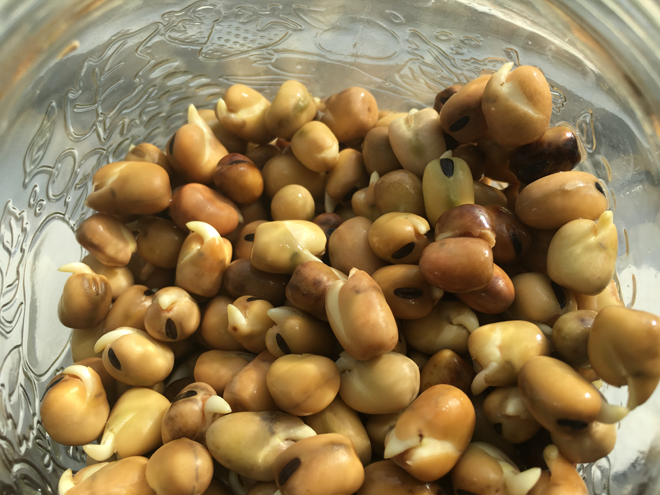
Fava beans have been a staple of Middle Eastern cuisines for thousands of years and show no signs of slowing down. Fuul Nabet, as they are called in Arabic, are commonly sprouted by many cultures to increase their nutritional value. They have a buttery texture and a rich nutty flavour that truly differentiates them from other beans. It is best to cook these sprouts before consumption.
More history: Archaeological excavations in the Galilee area of northern Israel provided evidence that prehistoric man 10,000 years ago consumed lentils, several types of peas and chickpeas, and especially fava beans. You can read the full study published in Nature here. Clearly, the Neolithic diet consisted of protein-rich legumes.
Health Benefits:
- Fava beans are 28% protein and just 3% fat!
- Eating just 100g of fava beans provides you with 66% of the recommended dietary allowance for fiber.
- Rich in phytonutrients such as isoflavone and plant sterols which have been shown to lower cholesterol.
- Rich in folate (natural form of folic acid). Just 100g of fava beans provides 106% of recommended folate.
- Fava beans contain levodopa, the same chemical in medicines used to treat Parkinson’s disease.
- Rich in b vitamins which help metabolize carbohydrates, proteins and fats.
- Provide a full spectrum of minerals such as iron, copper, manganese, potassium, selenium, calcium and magnesium.
Nutritional info:
Rich in vitamins B-1, B-6, K, C, folate.
Manganese, selenium, iron, copper, phosphorus, potassium and magnesium.
Fiber, Phytonutrients,
Protein: 28%
Traditionally Used for:
- Weight loss
- Cancer prevention
- Heart health
- Cholesterol
- Protein
- Fiber
- Digestive tract function
- Colon health
- Blood sugar/ Diabetes
- Currently being studied for the treatment of Parkinson’s disease





















